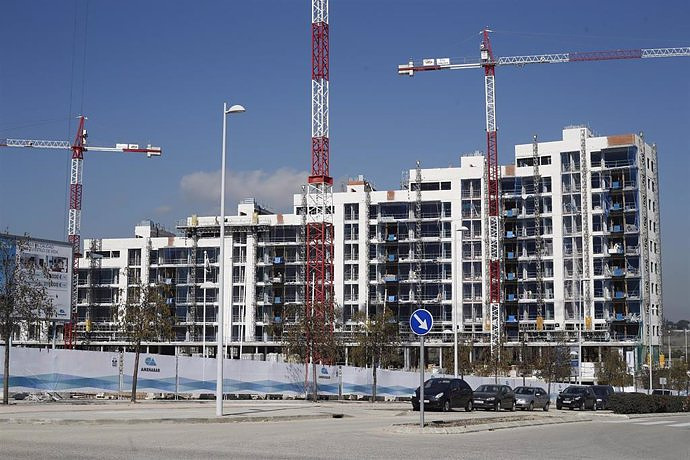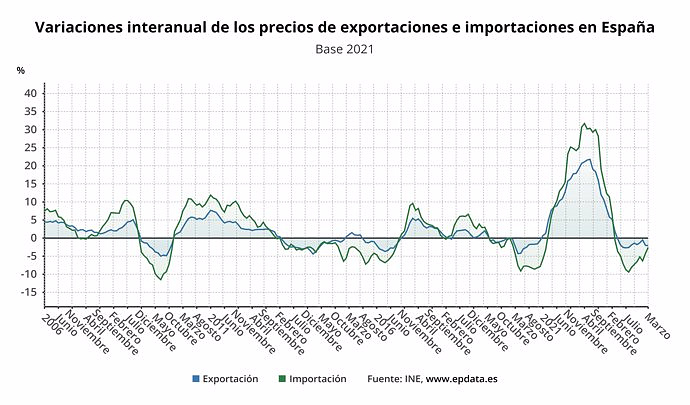They ask Sánchez to agree on the energy saving plan if he wants their support and demand that the decree be processed as a project to change it
MADRID, 3 Ago. (EUROPA PRESS) -
The coordinator of Social Policies of the PP, Marta González, has warned of the risk that turning off lights in shop windows and public buildings established by the decree on energy saving measures may entail for women and has called on President Pedro Sánchez to negotiate the plan with the PP, as well as with affected sectors, city councils and autonomies, especially when communities like the Basque Country, where the PNV and the PSE govern in coalition, have also publicly questioned it.
"It is not only the Community of Madrid that expresses its rejection of the measures of the decree, but for example the Government of the Basque Country, where the PP does not govern, has expressed its rejection of part of those measures and has stated that it is going to fail to comply," González told reporters in an appearance at the PP headquarters.
The 'popular' leader has assured that with this decree the Government "repeats" the same model it used during the pandemic and that "the central government decides, without consulting practically anyone" and the Autonomous Communities "have to fight " and "start it up". "It does not seem that this is the way to work in what the Government itself calls co-governance", she has denounced.
At this point, he has insisted that, apart from Madrid, more autonomies such as Murcia or Andalusia have criticized that the Executive is committed to "imposing" measures without dialogue, while stressing that many professional sectors are expressing "their displeasure and absolute rejection" to government measures. "Therefore, there is much to negotiate and much to discuss," he stressed.
When asked if the PP is open to abstention in the validation of the decree in Congress at the end of August and even the vote in favor if it is processed as a bill, González has assured that "depending on what the final result is ", This is how the vote of the Popular Group will be in the Lower House.
González explained that Alberto Núñez Feijóo recently presented a plan of energy saving measures that "didn't have so much to do with the issue of closing or turning off all the lights at a certain time, but rather it was much more ambitious", because it included measures such as " a review of the nuclear policy" to extend the life of the plants or allocate European funds so that the reduction in energy costs would be greater.
In his view, the PP has opted for "more incisive" measures than those included in the Government's royal decree because it is "clear" that the Popular Party considers it necessary to "reduce energy spending."
At this point, he has criticized the Government's actions, with "contradictory" messages, since at the beginning Vice President Teresa Ribera expressed her rejection of a "sacrifice" by the Spaniards and in the end the Executive has ended up approving a real decree.
"It gives the feeling that the Government is continually putting patches and changing its opinion every 24 hours based on circumstances that sometimes we are even unaware of," he declared, adding that if the PP is going to "need the favorable vote" of the Popular Group , "the logical thing would be for him to talk" with him and incorporate some of Feijóo's measures.
When asked if the PP would understand that Isabel Díaz Ayuso did not apply the measures -the Madrid president has threatened to take the decree to the Constitutional Court-, González indicated that his party will "see what happens in the end with the royal decree" and he is going to "analyze it in its entirety because there has not been enough time yet".
However, he has reiterated that "there are more and more voices against the measures established in that decree", with autonomies such as the Basque Government but sectors such as "industry, the self-employed or commerce" that agree that "the results will be very pernicious for their activity".
For this reason, he has stressed that they want to see "what happens with the measures" because the Executive "changes its opinion every 24 hours" and "it can be expected that some of them will be modified" in the face of the "opposition" they are receiving.
As for whether the national leadership of the PP will give freedom to its Autonomous Communities to comply with the decree or not, he has highlighted that there are voices that believe that the text is "doubtful from the point of view of constitutionality" as it is not clear who you must decide your application, whether central government or CCAA. "There has not yet been an in-depth analysis by the PP and that will be what we will do in the coming days," he asserted.
Marta González, who has appeared before the media to demand from the Government a protocol against punctures against women and to update the State Pact against gender-based violence with "consensus", has warned of the negative consequences for the safety of women that this would imply the turning off of the lights included in the royal decree for energy saving.
Thus, and after emphasizing that violence against women "remains", he has warned that the fact that the lights of the shops are turned off after a certain time can have "positive consequences from the point of view of energy saving" but also "very negative in relation to the safety of women in the streets".
"It seems that the Government has not been concerned about this issue because we have not seen anything mentioned and we in this context and at this time are concerned and extraordinarily," the Galician deputy emphasized.

 Exploring Cardano: Inner Workings and Advantages of this Cryptocurrency
Exploring Cardano: Inner Workings and Advantages of this Cryptocurrency Seville.- Economy.- Innova.- STSA inaugurates its new painting and sealing hangar in San Pablo, for 18 million
Seville.- Economy.- Innova.- STSA inaugurates its new painting and sealing hangar in San Pablo, for 18 million Innova.- More than 300 volunteers join the Andalucía Compromiso Digital network in one month to facilitate access to ICT
Innova.- More than 300 volunteers join the Andalucía Compromiso Digital network in one month to facilitate access to ICT Innova.-AMP.- Ayesa acquires 51% of Sadiel, which will create new technological engineering products and expand markets
Innova.-AMP.- Ayesa acquires 51% of Sadiel, which will create new technological engineering products and expand markets Nadal is still alive and exciting in Madrid
Nadal is still alive and exciting in Madrid The Treasury injected another 500 million into the SEPI in March to purchase Telefónica shares
The Treasury injected another 500 million into the SEPI in March to purchase Telefónica shares The complaints from ERC and PP against Sánchez's interview do not reach the JEC in time, which did not consider suspending it
The complaints from ERC and PP against Sánchez's interview do not reach the JEC in time, which did not consider suspending it Occupancy in Spain for the May long weekend exceeds 80%, with Andalusia and the Canary Islands as preferred destinations
Occupancy in Spain for the May long weekend exceeds 80%, with Andalusia and the Canary Islands as preferred destinations How Blockchain in being used to shape the future
How Blockchain in being used to shape the future Not just BTC and ETH: Here Are Some More Interesting Coins Worth Focusing on
Not just BTC and ETH: Here Are Some More Interesting Coins Worth Focusing on They create a bank of machinery sounds to prevent breakdowns through artificial intelligence
They create a bank of machinery sounds to prevent breakdowns through artificial intelligence UPV students build a prototype of a wooden house to move to Equatorial Guinea
UPV students build a prototype of a wooden house to move to Equatorial Guinea The UA opens the call for the Impulso 2024 Awards for the best innovative business initiatives
The UA opens the call for the Impulso 2024 Awards for the best innovative business initiatives ALI, virtual assistant from Alicante, internationally recognized by the OECD
ALI, virtual assistant from Alicante, internationally recognized by the OECD A million people demonstrate in France against Macron's pension reform
A million people demonstrate in France against Macron's pension reform Russia launches several missiles against "critical infrastructure" in the city of Zaporizhia
Russia launches several missiles against "critical infrastructure" in the city of Zaporizhia A "procession" remembers the dead of the Calabria shipwreck as bodies continue to wash up on the shore
A "procession" remembers the dead of the Calabria shipwreck as bodies continue to wash up on the shore Prison sentences handed down for three prominent Hong Kong pro-democracy activists
Prison sentences handed down for three prominent Hong Kong pro-democracy activists ETH continues to leave trading platforms, Ethereum balance on exchanges lowest in 3 years
ETH continues to leave trading platforms, Ethereum balance on exchanges lowest in 3 years Investors invest $450 million in Consensys, Ethereum incubator now valued at $7 billion
Investors invest $450 million in Consensys, Ethereum incubator now valued at $7 billion Alchemy Integrates Ethereum L2 Product Starknet to Enhance Web3 Scalability at a Price 100x Lower Than L1 Fees
Alchemy Integrates Ethereum L2 Product Starknet to Enhance Web3 Scalability at a Price 100x Lower Than L1 Fees Mining Report: Bitcoin's Electricity Consumption Declines by 25% in Q1 2022
Mining Report: Bitcoin's Electricity Consumption Declines by 25% in Q1 2022 Oil-to-Bitcoin Mining Firm Crusoe Energy Systems Raised $505 Million
Oil-to-Bitcoin Mining Firm Crusoe Energy Systems Raised $505 Million Microbt reveals the latest Bitcoin mining rigs -- Machines produce up to 126 TH/s with custom 5nm chip design
Microbt reveals the latest Bitcoin mining rigs -- Machines produce up to 126 TH/s with custom 5nm chip design Bitcoin's Mining Difficulty Hits a Lifetime High, With More Than 90% of BTC Supply Issued
Bitcoin's Mining Difficulty Hits a Lifetime High, With More Than 90% of BTC Supply Issued The Biggest Movers are Near, EOS, and RUNE during Friday's Selloff
The Biggest Movers are Near, EOS, and RUNE during Friday's Selloff Global Markets Spooked by a Hawkish Fed and Covid, Stocks and Crypto Gain After Musk Buys Twitter
Global Markets Spooked by a Hawkish Fed and Covid, Stocks and Crypto Gain After Musk Buys Twitter Bitso to offset carbon emissions from the Trading Platform's ERC20, ETH, and BTC Transactions
Bitso to offset carbon emissions from the Trading Platform's ERC20, ETH, and BTC Transactions Draftkings Announces 2022 College Hoops NFT Selection for March Madness
Draftkings Announces 2022 College Hoops NFT Selection for March Madness



























